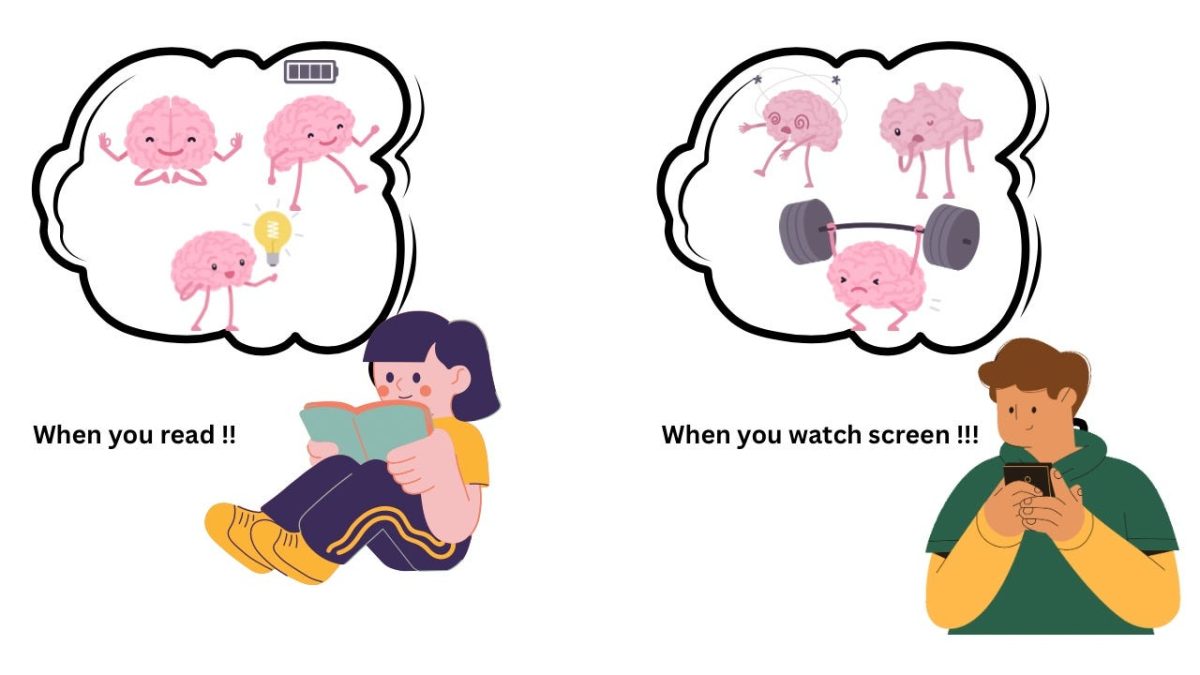Seven hours and twenty-two minutes: the amount of time most people think we spend in school or at work. Maybe it’s how long we should be sleeping, but no, it’s how long the average teenager spends looking at a screen outside of school.
I am sure all of us are tired of hearing our parents tell us to get off our phones, or that sitting too close to the TV is going to rot your brain. However, how much of that should we actually be taking to heart? Many different studies have been conducted to try and figure out if the amount of time we spend looking at a screen has any effect on our brains and mental health, and it does.
The amount of time you spend looking at a screen every day directly affects your ability to learn, your memory, and your mental health. Studies also show that people who watch more than five hours of TV a day are more at risk for developing diseases in their brains, like dementia and stroke. Excessive screen time also increases the risk of premature neurodegeneration, which is a disorder that over time destroys the nervous system. All of this happens as a result of the thinning of the cerebral cortex. The cerebral cortex is the outer layer of your brain and is made up of 14 to 16 billion nerves. The cerebral cortex is responsible for carrying out the majority of your day-to-day functions such as memory, thinking, learning, reasoning, problem-solving, emotions, and consciousness.
Analysis also shows that the majority of people who have trouble falling asleep or staying asleep, all tend to spend too much time looking at their screens, specifically at night or in the evenings. When the sun sets, your body naturally produces a chemical called melatonin to help you fall asleep. When you spend too much time looking at your phone before bed, the light from the screen imitates sunlight and keeps your body from producing the melatonin it needs to enter rest.
Other research suggests that people with a phone addiction and or who have a high screen time level have less gray matter. Grey matter is tissue in the brain that is responsible for just about everything we do. Grey matter promotes mental health, movement and exercise, and sleep and connection.
“Passive screen time is like eating sugar but for your brain. It ‘tastes’ good, and you want it now, but you’re not actually feeding yourself. You’re not giving your brain any nutrition,” says Maris Loeffler, MA, Family and Marriage Therapist, and member of the Stanford Lifestyle Medicine Cognitive Enhancement pillar. “Instead, replace screen time with an intentional healthy habit that feeds your brain in a healthy way. Lifestyle medicine activities like exercise, good sleep, social connection, and stress management, function like ‘nutrition’ for your brain and mental health.”
Loeffler also says that we should be specifically careful not to pick our phones up first thing in the morning. Scrolling through social media so early in the morning can shock your nervous system and trigger your fight or flight response because we aren’t fully awake yet. If we create a pattern of looking through our phones right when we wake up, we trick our bodies into having our fight or flight response as our natural mode of operation. Therefore, it makes your days more anxiety-filled. Lack of sleep can also affect your immune system, making it easier for you to get sick. It also affects your ability to concentrate, learn, and remember things. During the night, while you sleep, your brain is storing all the information you learned during the day. Not sleeping often makes it next to impossible to recall this information.
In conclusion, there are many negative effects that our screens can have on our bodies. However, I don’t think the invasion of technology is going to slow down anytime soon. I think we should start practicing more healthy habits pertaining to our technology in order to protect and prepare ourselves for the onslaught of technological advances.
Works Cited
“Can Too Much Screen Time Harm You?” scholastic.com, https://nida.nih.gov/sites/default/files/NIDA_YR18_INS3_ACTION_StuMag_2pg_508.pdf.
Descourouez, Mary Grace. “What Excessive Screen Time Does to the Adult Brain.” Stanford Lifestyle Medicine, 30th May 2024, https://longevity.stanford.edu/lifestyle/2024/05/30/what-excessive-screen-time-does-to-the-adult-brain/#:~:text=The%20study%20shows%20that%20in,%2Dmaking%20and%20problem%2Dsolving.
S.R., Venkat. “Cerebral Cortex: What to Know.” webmd.com, Jabeem Begum, 1st September 2022, https://www.webmd.com/brain/cerebral-cortex-what-to-know.








